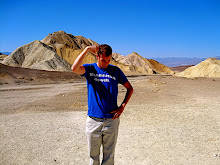I spent a week in Algiers, doing a survey for the European Commission, a new contract we were awarded in the past month. This client brings us a bunch of new money and a bigger profile in the European community, but with it comes a new 180 page survey. The downside of these surveys is they are more than twice as long as the longest previous survey. The upside is you get to travel with another surveyor to get it all done, which means more entertainment opportunities and someone to have dinner and complain about work with...I did my first survey of this length, the previous week in New York City, which was pretty easy and a nice exercise in learning all the new items in the basket of goods.

Road to Tipaza, Algeria
Algeria is the 2nd largest country in Africa and in the Arab world. It is predominantly muslim (99.5%) and an interesting mix of French and African. Algeria has had a long and sordid history starting with Ottoman and Roman rule, leading to French colonization, a terribly bloody independence war, and clashes between government and rebel groups killing 100,000's leading into this decade. Algeria has developed in leaps and bounds in the past 10 years and the economy is quite strong. However, in 2007 there were a few city bombings that killed and injured many; mostly targeted towards foreigners, and Al-Qaeda has a strong presence in the country.

Makam Echahid, Algerian Independence Memorial
Algeria has a booming oil reserve, thought to be the 8th largest in the world and this makes up for 95% of its export revenue; thus many major oil companies are set up here, and in turn bringing me to Algiers to conduct a foreign worker's cost-of-living survey.

"The White City"
Algiers is a beautiful mediterranean city, entrenched in white cement buildings donning it the nickname "The white city." Like many developing cities, it has an old town with a french architectural influence and a modern town which is more developed and arab looking, both of them quite nice in their own respect. Algiers is currently ranked lowest out of 132 capitals in the Economist Intelligence Unit's quality of life survey. This survey takes into consideration 40 different criteria including: stability, health services, culture and environment, education and the availability of basic services. Algiers was ranked lower than Karachi, Tripoli, Abidja and even Dhaka.

Algiers City Blocks
The Casbah is the most well known part of the city, a World Heritage site in the north part of the city. It is, however, not a very safe part of the city from pickpocketing, muggings and kidnappings. Our driver said he must walk with us when we visited, to feel much safer. This was appreciated of course. The city is full of beautiful mosques, small and large, scattered around the city.

Djemma Mosque

Notre D'ame de Afrique
90 km west of the city is the ancient Roman ruins of Tipaza, buildings from the 1st century are preserved here quite well, and our visit was my first to a Roman ruins site. Previously I had only seen Latin American ruins, and it was interesting to see the contrast. Commercially this was an important Roman hub and was also an Unesco World Heritage site. Along the way, we passed through some beautiful beach towns, stopped for some shopping and a fresh fish lunch on the harbor.

Tipaza Ruins

Tipaza Ruins




1 comment:
amazing photos as always. no pictures of french fries? Because that's what I'll always think of when you say Algeria.
Post a Comment